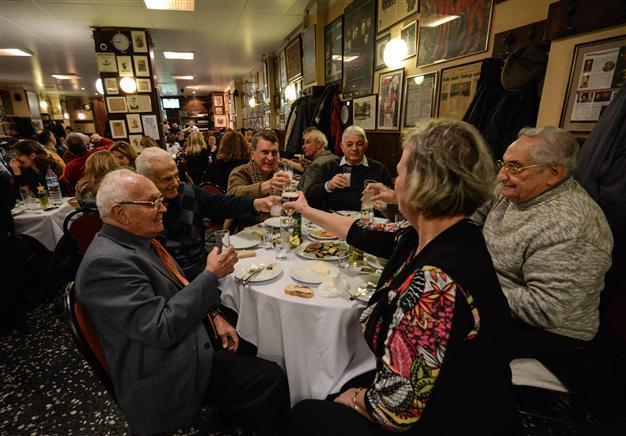Turkey’s liquor sector concerned over decline in consumption
Demet Cengiz ISTANBUL / Hürriyet

The beer market in Turkey shrank by 12 percent in 2013 after Turkey banned alcohol advertising and tightened restrictions on its sale. HÜRRİYET photo
A decision by Turkey’s biggest brewer to shut down a production facility due to declining sales has sent shockwaves through the country’s alcoholic beverages sector.Players in the sector, especially wine producers, are feeling the pressure of tough regulations as alcohol fights to survive in a tough environment.
Anadolu Efes, which has faced setbacks in its main markets in Turkey and Russia due to legal regulations, announced April 2 that it had decided to shut down its Lüleburgaz factory in the northwestern province of Kırklareli, four months after closing two breweries in Russia.
The beer market in Turkey shrank by 12 percent in 2013 after Turkey banned alcohol advertising and tightened restrictions on its sale. Price hikes in the market stemming from the rise in Special Consumption Tax (ÖTV) caused a further retreat in the company’s revenues. Beer makes up 90 percent of alcoholic beverage consumption in Turkey, which fell to just over 1 billion liters in 2013 from 1.12 billion liters in 2012.
Selim Ellialtı, the owner of wine producer Suvla, said the sector’s morale had long been hurt by the government’s strict regulations.
“As boutique wine producers, we produce healthy, quality products,” Ellialtı told daily Hürriyet. “Our products do not contain high alcohol, but they are treated as grain alcohol. The small producers cannot express themselves because promotion and tasting have been banned. Winegrowers are also concerned that no one will buy their grapes.”
But Ali Başman, the owner of one of Turkey’s oldest wine producers, Kavaklıdere, said wine had been less affected by the bans.
“Other liquors have been affected more,” he said. “Wine is a low-alcoholic drink that is usually consumed during dinner. The wine consumer’s aim is not to drink alcohol. No one buys alcohol after 10 p.m., or no one buys wine from petrol stations. These bans have not affected wine sales. What has affected us is the ban on promotion and advertisement. Efes’ decision to shut down a plant has had repercussions in the sector; the fact that one of the biggest figures in the sector made such a decision leads to concerns. The investments are long term in wine sector; you wait for 10 years to get results from a vineyard. Wine producers tend not to make new investments, and that scares vineyard owners and villagers.”
The prices have not been increased despite the tax hike, said Kocabağ Wines Marketing Director Memduh Erdoğan.
“This has reduced the profits,” he said. “It looks like the wine consumption has increased, but in fact, the supply has increased. In addition, some supermarket chains have stopped selling alcohol after a change in owners, which hit sales … more than the 10 p.m. restriction. There was a 15-20 percent decline in retail sales.”
According to a report by the Health Ministry, 23 percent of men in Turkey and 4 percent of women consume alcohol. The report shows that alcohol consumption per person in Turkey is way behind the world average. According to the report, 14 percent of men who drink liquor do so once a month or less, while only 5 percent say they drink two-three times a week.
















